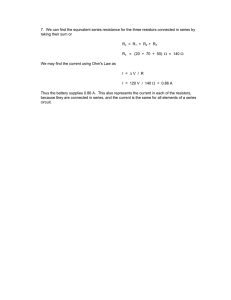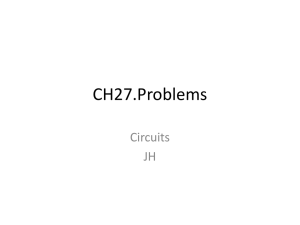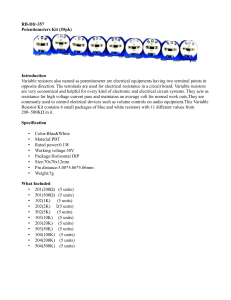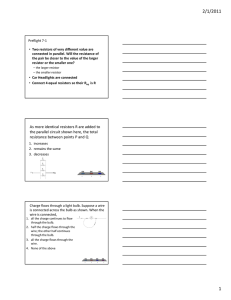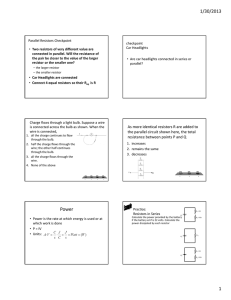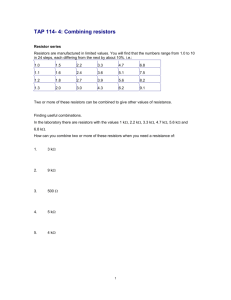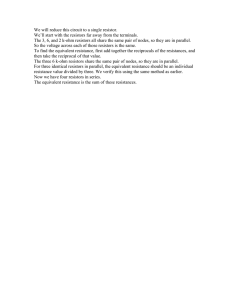263 363 626.0 463 563 1026 rrrrrr = + = ω + ω = ω = + = ω+ ω = ω 1
advertisement
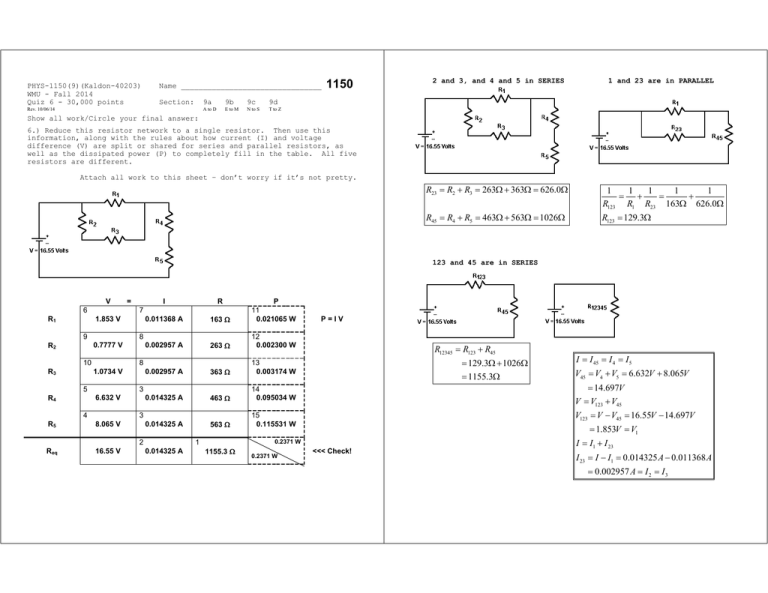
PHYS-1150(9)(Kaldon-40203) WMU - Fall 2014 Quiz 6 - 30,000 points Name ________________________________ Section: Rev. 10/06/14 9a 9b 9c 9d 9e 28f A to D E to M N to S T to Z Q to S T to Z 1150 2 and 3, and 4 and 5 in SERIES 1 and 23 are in PARALLEL R23 R2 R3 263 363 626.0 1 1 1 1 1 R123 R1 R23 163 626.0 R45 R4 R5 463 563 1026 R123 129.3 Show all work/Circle your final answer: 6.) Reduce this resistor network to a single resistor. Then use this information, along with the rules about how current (I) and voltage difference (V) are split or shared for series and parallel resistors, as well as the dissipated power (P) to completely fill in the table. All five resistors are different. Attach all work to this sheet – don’t worry if it’s not pretty. 123 and 45 are in SERIES V 6 9 10 5 163 0.002957 A 263 12 0.002300 W 0.002957 A 363 13 0.003174 W 0.014325 A 463 14 0.095034 W 563 15 0.115531 W 3 6.632 V R4 0.011368 A P 11 0.021065 W 8 1.0734 V R3 R 8 0.7777 V R2 I 7 1.853 V R1 4 R5 = 3 8.065 V 0.014325 A 2 Req 16.55 V R12345 R123 R45 129.3 1026 1155.3 1155.3 0.2371 W I I 45 I 4 I 5 V45 V4 V5 6.632V 8.065V 14.697V V V123 V45 V123 V V45 16.55V 14.697V 1.853V V1 0.2371 W 1 0.014325 A P=IV <<< Check! I I1 I 23 I 23 I I1 0.014325 A 0.011368 A 0.002957 A I 2 I 3 NOTE: While I usually find that keeping an extra digit around is useful, 3+1 sig. figs. for example, filling in the table is one of those cases where even 1 extra sig. fig. in the intermediate calculations isn’t always quite enough to get the fractions to come out right. Here’s the data in the table run through a Excel spreadsheet: 1 2 3 4 5 Total volts V 1.852259 0.778935 1.075108 6.632606 8.065135 16.55 amps I 0.011364 0.002962 0.002962 0.014325 0.014325 0.014325 ohms R 163 263 363 463 563 1155.3 Watts P 0.021048 0.002307 0.003184 0.095014 0.115535 0.237083 0.237089 BLACK = given values, RED = calculated values, BLUE = copied values Now we get pretty good agreement between the Power of the Equivalent Resistance and the Sum of the Resistors! Yet the individuals values are not that different, though even here, V2 + V3 isn’t quite the same as V1 .
